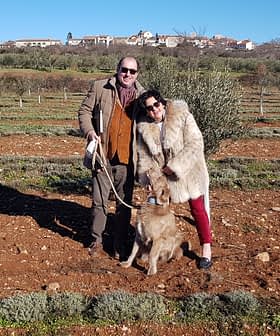In the new book, Extra Virginity: The Sublime and Scandalous World of Olive Oil, there’s plenty of blame to go around for the “widespread dumbing down of olive oil quality,” but author Tom Mueller reserves perhaps his most direct castigation for the International Olive Council.
“Today this once-progressive organization, which invented a revolutionary definition of olive oil quality and spread the gospel of good oil in many parts of the world,” Mueller writes, “all too often helps to hold extra virgin quality to the lowest common denominator, protecting the interests of Big Oil rather than helping producers of genuine extra virgins — much less consumers.”
The International Olive Council (IOC) is the intergovernmental organization formed by the United Nations in 1959 to provide financial and technical assistance to its eighteen member countries. The agency established groundbreaking scientific taste tests and chemical limits for olive oil grades, set the rules of trade and guided the industry through decades of expansion.
In 2002, the agency’s Executive Director, Fausto Luchetti, was accused by the European Union of mismanaging IOC funds and resigned. Since then the resources allocated to the Council have been sharply reduced — even while global olive oil production has soared to 3 million tons.
Lately, the olive oil industry has been struggling with a wrenching crisis brought on by mass-market price wars and a flood of low-quality olive oil — a lot of it falsely labeled extra virgin.
Countless olive oil producers teeter on the edge of viability. Many farms are calculating now, in the midst of the Northern Hemisphere’s harvest season, whether it’s even worth pulling the olives from the trees for crushing, or let them fall to the ground and rot away.
Prices recently hit levels low enough in Spain to trigger the so-called “private storage aid” from the European Union, where qualifying producers can receive payments for keeping their olive oil in tanks for six months, withholding the supply from the market.
Up-and-coming New World producers, unable to compete on price with the lower-quality, subsidized imports are growing louder, desperately calling for consumers to consider olive oil quality in their buying decisions. For some, time is running out. At least one major producer — Kailis Organic in Australia — has reportedly filed for bankruptcy protection, according to a source.
Jean-Louis Barjol, in his first year leading the agency, has called for greater cooperation as he grapples with the pricing crisis, highly-publicized reports critical of olive oil quality, and New World challenges to the IOC trade standards.
When Tom Mueller was asked if he thought Jean-Louis Barjol was doing enough to change things, his reply was. “Hmm. No.”
In a phone interview, Mueller, whose first book is days from its release, said of the IOC director, “Based on his IOC-led offensive in Australia, which is really quite amazing, I don’t believe Barjol will lead change in the direction of promoting olive oil quality.” Mueller was referring to the IOC response to the new quality standard recently adopted in Australia.
“Barjol and other representatives of major olive oil concerns in the Old World have their hands tied politically, socially and economically from really making a move to quality because they have so many people to take care of and such a huge economic responsibility to their constituents — many of whom are making commodity oil. So they (the IOC) have a hard time acting for quality.”
Mueller nevertheless believes the presence of Barjol and representatives from the powerful Spanish trade group Interprofesional del Aceite de Oliva Español at the June, 2011 Beyond Extra Virgin conference in Córdoba, Spain was an “historic event.”
“I think they do realize that the model they have — commoditizing a potentially highly valuable product, and driving it to the lowest common denominator — is broken, and I think they see that something has to happen. But they are in a very difficult position to make that push for quality. And the tactics they’re using to prevent that from happening in export markets are scandalous. They are not, unfortunately, representing olive oil in its best light and that doesn’t serve their long-term interests.”
Asked about the $1.7 million campaign recently launched by the IOC to promote olive oil consumption in North America, Mueller had this to say:
“You know, I think I checked out their Facebook page for about five minutes, and there was Mercedes, and there was Fashion Week, and there were some very stylish people in the kitchen drinking wine, and I kept looking, and kept looking and I couldn’t see any olive oil. They’re not talking about what’s in the bottle, and is it excellent.”








